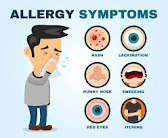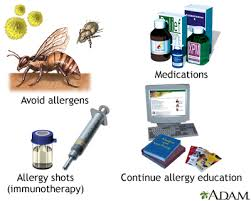Allergies ,causes,symptoms, treatment, prevention
Allergies
Allergies are an immune response triggered by typically harmful substances known as allergens.
Causes
Allergy sufferers have extremely sensitive immune systems that react to allergens when they come into contact with them.
Some common allergens are:
foods (including nuts, eggs, milk, soy, shellfish, and wheat) pollen, mold, latex, and pet dander Symptoms Because there are so many possible causes, allergies can have a wide range of symptoms. Pollen and pet dander, two examples of airborne allergens, are likely to cause:
Symptoms of eye irritation
Treatment
If you have allergies to pollen, you should stay inside when pollen counts are high and close the windows in your room.
Other than drugs and food, medication may be required to alleviate symptoms brought on by allergens because it is difficult to avoid certain ones.
Prevention
Avoid going outside between the hours of 5 and 10 in the morning, and plan outdoor activities for later in the day or after a heavy downpour, when pollen levels are lower.
To reduce pollen exposure, close your living room windows.
Use air conditioners to keep cool, and don't use window or attic fans.
In the event of a reaction, wear a medical alert bracelet or use another method to inform others of your allergy.
If you are at risk for a serious allergic reaction, talk to your doctor about getting a prescription for epinephrine, like an EpiPen.
Before purchasing or consuming any product, carefully read the label to ensure that you are aware of the contents.
Viruses Influenza and colds are the most prevalent illnesses among college students.
Causes Both of these diseases affect the lungs, nose, and throat, or upper respiratory tract. Both the common cold and the flu are brought on by viruses that make the membranes in the nose and throat more inflamed.
The majority of these viruses are passed from person to person through contact.
Symptoms Flu symptoms appear suddenly and spread throughout the body. Typically, flu symptoms are more serious than a cold:
fever (100 degrees Fahrenheit), severe, frequently dry cough, severe pain, and fatigue.
Bronchitis, sinus infections, and ear infections are also more likely to occur when you have the flu.
Most of the symptoms of a cold are above the neck, and they include:
a sore throat, cough, runny or stuffy nose (nasal congestion).
Additionally, you may experience a mild fever, body aches, or headache. A cold typically lasts two to fourteen days.
Treatment If you are experiencing any discomfort, you should see a doctor.
Immediately seek medical attention if you have:
a fever of 102 degrees Fahrenheit or higher (which may indicate a more serious infection), a persistent cough, particularly when accompanied by a significant fever (which may indicate pneumonia), a persistent sore throat (especially if a runny nose does not develop - which may indicate a strep infection), or any cold that persists for more than 10 days.
Antibiotics cannot treat the flu and cold because they are caused by viruses. There are some things you can do to feel better and make your immune system stronger to fight illness:
Until the symptoms go away, take more rest than usual and don't exercise.
Drink a lot of clear liquids, like tea and water.
Avoid smoking cigarettes.
Antibiotics should not be taken unless they are specifically prescribed to treat your illness.
Because alcohol weakens your immune system and may interact with medications, you should avoid it.
Avoid caffeine because it can make congestion worse and dehydration worse.
Eat a well-balanced diet that includes grains, fruits, and vegetables.
More Specific Treatment Options for Constipation and a Runny Nose:
Decongestants, like pseudoephedrine, can help clear congestion and a runny nose, but they can also make it hard to sleep and make you eat less.
Nasal sprays containing salt water, such as NaSal or Ocean, can reduce congestion and thin mucus. However, using medicated nose sprays like Afrin in excess can lead to dependence and worsen congestion.
Mucus can be cleared from the nose with the assistance of humidifiers and hot showers.






good work
ReplyDelete